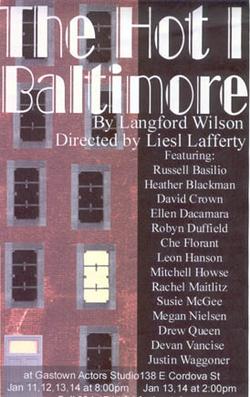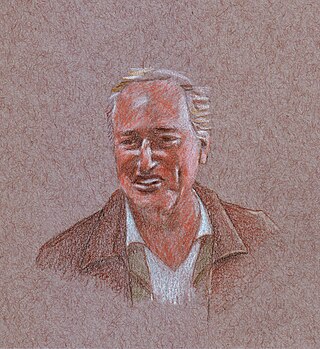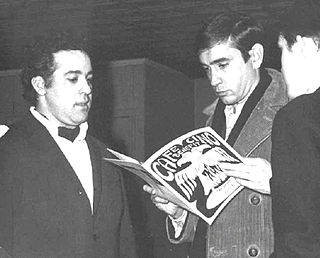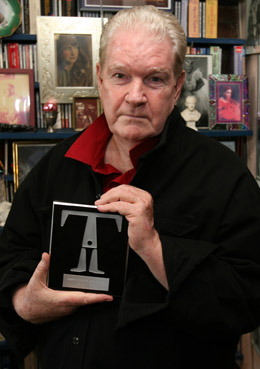Related Research Articles
Lanford Wilson was an American playwright. His work, as described by The New York Times, was "earthy, realist, greatly admired [and] widely performed". Wilson helped to advance the off-off-Broadway theater movement with his earliest plays, which were first produced at the Caffe Cino beginning in 1964. He was one of the first playwrights to move from off-off-Broadway to off-Broadway, then Broadway and beyond.

Angels in America: A Gay Fantasia on National Themes is a 1991 American two-part play by American playwright Tony Kushner. The two parts of the play, Millennium Approaches and Perestroika, may be presented separately. The work won numerous awards, including the Pulitzer Prize for Drama, the Tony Award for Best Play, and the Drama Desk Award for Outstanding Play. Part one of the play premiered in 1991, followed by part two in 1992. Its Broadway opening was in 1993.

The Hot L Baltimore is a 1973 American play by Lanford Wilson set in the lobby of the Hotel Baltimore. The plot focuses on the residents of the decaying property, who are faced with eviction when the structure is condemned. The play draws its title from the hotel's neon marquee with a burned-out "e" that was never replaced.

Marshall W. Mason is an American theater director, educator, and writer. Mason founded the Circle Repertory Company in New York City and was artistic director of the company for 18 years (1969–1987). He received an Obie Award for Sustained Achievement in 1983. In 2016, he received the Tony Award for Lifetime Achievement in the Theater.

Joseph Cino, was an Italian-American theatre producer. The Off-Off-Broadway theatre movement is generally credited to have begun at Cino's Caffe Cino in the West Village of Manhattan.

Burn This is a play by Lanford Wilson. Like much of Wilson's work, the play includes themes of gay identity and relationships.
The AIDS Show is a 1984 American collaboratively written theatre piece created to address the social impact HIV/AIDS had on the LGBTQ community. A 1986 documentary film of the same name was developed by producer and writer Rob Epstein and filmmaker Peter Adair.
Founded in 1976 by John Glines, Barry Laine and Jerry Tobin, The Glines is an American not-for-profit organization based in New York City, New York, devoted to creating and presenting gay art to develop positive self-images and dispel negative stereotyping.

Doric Wilson was an American playwright, director, producer, critic and gay rights activist.

The Redstone Building, also known as the Redstone Labor Temple, was constructed and operated by the San Francisco Labor Council Hall Associates. Initial planning started in 1910, with most construction work done during 1914. Its primary tenant was the San Francisco Labor Council, including 22 labor union offices as well as meeting halls. The building was a hub of union organizing and work activities and a "primary center for the city's historic labor community for over half a century."
Michael Vega is an American actor. He grew up in central New Jersey and attended Trenton State College where he studied theatre and communications. After spending several years in New York City, Vega moved in 2002 to the San Francisco Bay Area and has enjoyed great success in theatre, including appearances in Schoenberg by John Fisher, Bent by Martin Sherman, and A Queer Carol by Joe Godfrey, all at Theater Rhinoceros in San Francisco, and The Gravedigger's Tango by Ian Walker at the Phoenix Theater in San Francisco.
Medea, the Musical is a 1994 musical comedy by American playwright John Fisher. The play, a farce, concerns a theater director's attempt to recast Medea, the ancient Greek tragedy by Euripides, as a serious modern commentary on LGBT culture, which goes humorously wrong when the director's cast and crew refuse to conform to the stereotyped roles he has created for them. The play became a long-running "cult favorite" in San Francisco in the mid 1990s before touring regionally. Not to be confused with Medea The Musical written by English actress and playwright Hayley Canham which premiered in Cambridge in 2022.

Michael Kearns is an American actor, writer, director, teacher, producer, and activist. He is noted for being one of the first openly gay actors, and after an announcement on Entertainment Tonight in 1991, the first openly HIV-positive actor in Hollywood. Kearns attended the Goodman School of Drama in Chicago before moving to Los Angeles in 1972, where he has maintained a successful mainstream film and television career alongside an extensive theatrical involvement for over 25 years. He has been actively engaged in the Los Angeles art and political communities, incorporating activism into his theater works. Kearns co-founded Artists Confronting AIDS in 1984 and is a current commissioner of Parents, Families and Friends of Lesbians and Gays (PFLAG).

California Shakespeare Theater is a regional theater located in the San Francisco Bay Area of California. Its performance space, the Lt. G. H. Bruns III Memorial Amphitheater, is located in Orinda, while the administrative offices, rehearsal hall, costume and prop shop are located in Berkeley.

Haralambos Monroe "Harry" Koutoukas was a surrealist playwright, actor and teacher. Along with Sam Shepard, Lanford Wilson, Doric Wilson, Tom Eyen and Robert Patrick, Koutoukas was among the artists who gave birth to the Off-Off Broadway theatre movement of the 1960s and 1970s.

George Birimisa was an American playwright, actor, and theater director who contributed to gay theater during the 1960s, the early years of the Off-Off-Broadway movement.
The Madness of Lady Bright is a short play by Lanford Wilson, among the earliest of the gay theatre movement. The play was first performed at Joe Cino's Caffe Cino in May 1964.
Holding the Man is a 2006 Australian play written by Tommy Murphy, based on Tim Conigrave's memoir of the same title. It premiered in Sydney, where it won several awards, and then across Australia, as well as internationally–on London's West End and in Los Angeles.

Leland Moss was an American theatre director, writer, and gay activist who died from AIDS at age 41.
Michael Warren Powell was an American artistic director, director, actor and designer involved in the Off-Off-Broadway movement, Off-Broadway and in the development of new American plays.
References
- ↑ Joseph, Miranda (2002). Against the Romance of Community. University of Minnesota Press. p. 75. ISBN 9780816637966 . Retrieved 22 January 2021.
- ↑ "About Us". The Rhino. Retrieved 2023-05-03.
- ↑ "Finding Aid to the Theatre Rhinoceros Records, 1968-2009, bulk 1981-2001". oac.cdlib.org. Retrieved 2023-05-03.
- ↑ Schanke, Robert A. (2011). Queer Theatre and the Legacy of Cal Yeomans. Palmgrave Macmillan. p. 127. ISBN 9780230119888 . Retrieved 22 January 2021.
- ↑ Hawley, John Charles (2009). LGBTQ America Today: P-Z. Greenwood Press. p. 1194. ISBN 9780313339936.
- ↑ Baugniet, Lanny (2009). "Foreword". Birimisa: Portraits, Plays, Perversions: The Work of George Birimisa. Sweetheart Press. p. 2. ISBN 9780977421442 . Retrieved 22 January 2021.
- ↑ Román, David (1998). "One and Counting: Early AIDS Plays". Acts of Intervention: Performance, Gay Culture, and AIDS. Indiana University Press. p. 44. ISBN 9780253211682 . Retrieved 22 January 2021.
- ↑ Lewin, Ellen (1999). "Old Symbols, New Traditions". Recognizing Ourselves: Ceremonies of Lesbian and Gay Commitment. Columbia University Press. p. 47. ISBN 9780231103930 . Retrieved 22 January 2021.
- ↑ "Hispanic Heritage Month: Theatre Rhino Charges into The Castro with Reyes' Bad Hombres". San Francisco Bay Times. 2022-10-06. Retrieved 2023-02-04.